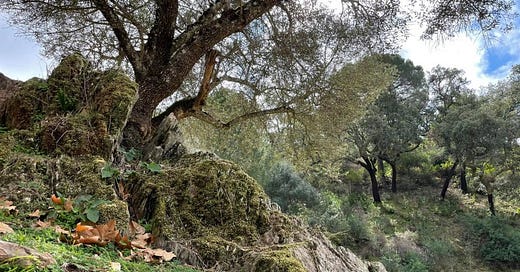Nature is not a Refuge, but Life.
In the romantic modern-urban narrative, Nature is often an escape, a refuge to escape the intensity of Life, schedules, responsibilities…
In the romantic modern-urban narrative, Nature is often an escape, a refuge to escape the intensity of Life, schedules, responsibilities, and to-dos. It is a pure place of calm and restoration of energy and health, either on hikes or retreats that regenerate us, physically and psychologically, where we are once again ready to return to the hustle and bustle of urban daily Life.
In this romantic idealization, Nature is tamely wild, organic, and slightly spontaneous but not too dangerous or demanding. We don’t want surprises; after all, we just need to rest, which requires truce, control, and security.
For Western minds, I remind you that it has been confirmed for decades that being “in nature” influences us regeneratively, the body activates and relaxes, the psyche goes into flux and releases, and bodily tissues regenerate. Something that all contextual and indigenous peoples have never forgotten.
After all, aren’t we Nature?
We cannot forget that modern lenses are thick and invisible, distorting our vision, even more so when we believe that our modern/western perspective is exceptional and more evolved than all the others, it becomes difficult, if not impossible, to make room for different perceptions to manifest themselves with equal dignity: imagination, dreams, whispers of the stones, singing of the trees, living stories everywhere. In other words, the animistic, sacred, somatic, non-verbal dialogue.
This mechanistic mind leads us from trap to trap of dissociation without realizing it. The natural environment is not inert, neutral, scientific, or out there, but as Gordon White says, “loaded with unexamined assumptions about the nature of Nature and our separation from it.”
Let us then look at the landscape as a living body, at the complex ecology surrounding us as if it were our bones, flesh, and skin, from the starry infinitude of the cosmos to the microscopic, subterranean depths. By becoming part of it again, if only for seconds, we realize that we are not at the center but part of it. We radically belong to this vast cosmic ecology. We are part of a complex orchestra without a conductor, with melodies in multiple rhythms and dimensions.
When we assume Nature as a refuge, we separate ourselves into a bubble of exceptionalism, ignoring the porous body and just going within, demanding and extracting the result of relaxation and “peace of mind,” missing once again what landscapes, in their fragility and potency, really need. Silencing the relationship, daily care, attention, and listening. Not about us, but Life.
We are silencing the howls of the stones, muting the trees, and stifling the ground. We silence everything by demanding refuge and peace in an individual and uniquely human exile.
This silencing is a substantial cultural mutilation, as we continue to think that we will “be better off” if we take a little bit out of our busy weekly schedule to take refuge, connect, and “be in Nature”. My point is that it’s not just a matter of individual time; it’s not even a matter of going. It’s about coming back. It’s body-in-place biology, a direct experience of belonging and being part of the web of Life, constantly happening, dynamically unfolding.
This ancient relationship and dialogue are not about our individual well-being, for in the great cosmic ecology we belong to, you, and I mean nothing more or less than a larva, a galaxy, a rock, or a cloud. And this does not take away our value; on the contrary, it offers us back to Life.
The poetic paradox is that the Nature in us, in direct resonance with ecologically living and diverse places, actually brings us peace and regeneration, even if our premises are extractivist, anthropocentric, or exclusively self-centered, even if we confuse rights and responsibilities. If we continue to ignore and silence our responsibility to care for these very places, if we don’t return the flow of regeneration, they will become extinct, consumed, and ruined without the possibility of supporting and nurturing Life. So alienated that we are looking for peace, we devour and swallow the web of Life.




